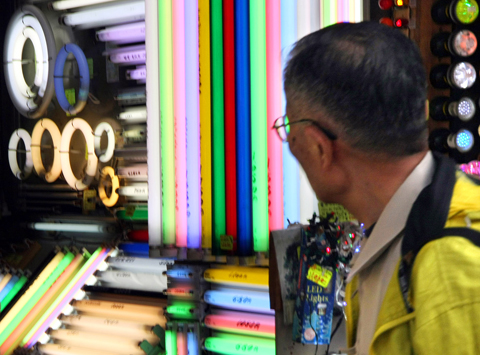A sharp rise in Japan’s industrial output is boosting hopes of a recovery in the world’s second-biggest economy even as government figures yesterday showed unemployment had reached a five-year high.
While companies are starting to bet on an economic upswing, Japan’s worst post-war recession is still impacting the economy through job losses and falling prices, the data show.
Factory output last month rose 5.2 percent from March, the fastest monthly jump in more than half a century and far above market expectations for an increase of around 3.3 percent, the trade ministry said.

PHOTO: BLOOMBERG
Industrial production was still down 31.2 percent year-on-year as the global slump continued to hit the export-driven economy, but the numbers showed production of electronic parts and chemicals was picking up.
The second monthly increase in a row suggested companies have run down stockpiles and will keep ramping up production. Manufacturers forecast output would rise 8.8 percent this month and 2.7 percent next month.
“This part of the data is very positive,” said Shinko Research Institute economist Norio Miyagawa, saying the data indicates that “output will likely remain firm this year.”
Naoki Murakami, Monex Securities chief economist, said in a report that “it is possible that the production index will bounce back to late-2008 levels by the summer in a nearly V-shaped recovery.”
The figures raised expectations Japan’s economy could start to grow again in the second quarter after shrinking 4 percent quarter on quarter in the three months to the end of March.
Hideyuki Araki, economist at Resona Research Institute, said: “Once factory production picks up, related services such as distribution will pick up. This could lead to a better labor market.”
But Araki also sounded a note of caution, stressing that “unemployment kept worsening ... because it’s a lagging economic indicator. There are concerns that continued worsening could dampen consumer spending.”
New figures yesterday showed that unemployment rose to 5 percent last month from 4.8 percent in March, the highest rate since November 2003.
“I’m quite disappointed that the job situation has deteriorated sharply,” Japanese Finance Minister Kaoru Yosano said. “But we have to accept it as reality and we need to monitor price and job conditions very carefully.”
Separate data showed there were only 46 job offers for every 100 job seekers, matching the worst ever figure in June 1999.
Average monthly household spending dropped 1.3 percent in real terms last month from a year earlier, falling for the 14th month in a row.

MORE VISITORS: The Tourism Administration said that it is seeing positive prospects in its efforts to expand the tourism market in North America and Europe Taiwan has been ranked as the cheapest place in the world to travel to this year, based on a list recommended by NerdWallet. The San Francisco-based personal finance company said that Taiwan topped the list of 16 nations it chose for budget travelers because US tourists do not need visas and travelers can easily have a good meal for less than US$10. A bus ride in Taipei costs just under US$0.50, while subway rides start at US$0.60, the firm said, adding that public transportation in Taiwan is easy to navigate. The firm also called Taiwan a “food lover’s paradise,” citing inexpensive breakfast stalls

TRADE: A mandatory declaration of origin for manufactured goods bound for the US is to take effect on May 7 to block China from exploiting Taiwan’s trade channels All products manufactured in Taiwan and exported to the US must include a signed declaration of origin starting on May 7, the Bureau of Foreign Trade announced yesterday. US President Donald Trump on April 2 imposed a 32 percent tariff on imports from Taiwan, but one week later announced a 90-day pause on its implementation. However, a universal 10 percent tariff was immediately applied to most imports from around the world. On April 12, the Trump administration further exempted computers, smartphones and semiconductors from the new tariffs. In response, President William Lai’s (賴清德) administration has introduced a series of countermeasures to support affected

CROSS-STRAIT: The vast majority of Taiwanese support maintaining the ‘status quo,’ while concern is rising about Beijing’s influence operations More than eight out of 10 Taiwanese reject Beijing’s “one country, two systems” framework for cross-strait relations, according to a survey released by the Mainland Affairs Council (MAC) on Thursday. The MAC’s latest quarterly survey found that 84.4 percent of respondents opposed Beijing’s “one country, two systems” formula for handling cross-strait relations — a figure consistent with past polling. Over the past three years, opposition to the framework has remained high, ranging from a low of 83.6 percent in April 2023 to a peak of 89.6 percent in April last year. In the most recent poll, 82.5 percent also rejected China’s

PLUGGING HOLES: The amendments would bring the legislation in line with systems found in other countries such as Japan and the US, Legislator Chen Kuan-ting said Democratic Progressive Party (DPP) Legislator Chen Kuan-ting (陳冠廷) has proposed amending national security legislation amid a spate of espionage cases. Potential gaps in security vetting procedures for personnel with access to sensitive information prompted him to propose the amendments, which would introduce changes to Article 14 of the Classified National Security Information Protection Act (國家機密保護法), Chen said yesterday. The proposal, which aims to enhance interagency vetting procedures and reduce the risk of classified information leaks, would establish a comprehensive security clearance system in Taiwan, he said. The amendment would require character and loyalty checks for civil servants and intelligence personnel prior to